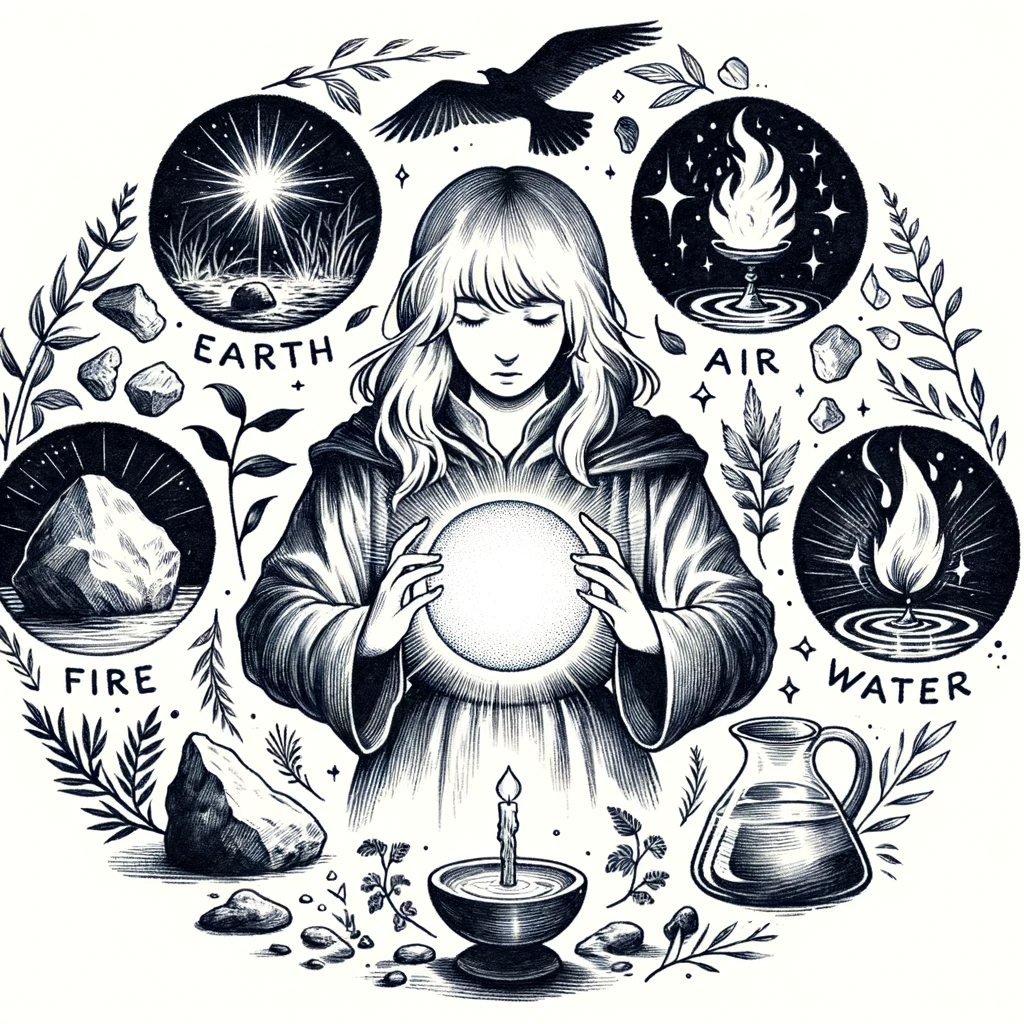We use language constantly… texting, thinking, venting, overthinking. But most of the time, we’re using words to get through the day, not to check in with ourselves. You might be saying “I’m fine” out loud while your insides are screaming something else entirely. And that’s where poetry, and intentional language in general, becomes something more than just pretty words. It becomes a tool.
You don’t have to be a poet. You don’t have to write anything anyone else sees. But using poetry and certain language habits on purpose can actually clear out mental static, help you get honest with yourself, and bring your emotions into focus.
This isn’t about writing flowery verses or trying to be deep for the sake of it. It’s about using the shape and sound of words to sort through what’s going on inside you. It’s messy, surprising, sometimes uncomfortable, and exactly what clarity requires.
Let’s get into it.
Poetry as a Mirror: Seeing Yourself Through Metaphor
Language is sneaky. You can be walking around thinking you’re confused or blank or numb, and then one weird little metaphor pops into your head and suddenly, bam, there’s the truth. Poetry, especially the kind that uses metaphor and imagery, acts like a mirror that doesn’t just show your face, but your mood, your thoughts, your buried stuff.
Why metaphor cuts deeper than explanation
Saying “I feel heavy” hits different than “I’m sad.” Describing your anger as a hornet in a jar feels a lot more alive than just calling yourself mad. Metaphors give shape and color to feelings that are hard to pin down with plain labels.
You might not know exactly what you’re feeling until you describe it like weather, or an object, or a landscape. That’s the magic of poetry. It lets you be honest without having to explain yourself.
Sometimes, putting emotions into straight-up sentences feels too stiff or fake. But if you can say “my stomach feels like a crowded subway” or “my thoughts are moths against a lightbulb,” you’re telling the truth in a way your brain can actually listen to.
The power of writing poems just for you
This isn’t about being “a writer.” This isn’t even about making sense. It’s about permission. You get to write weird, raw, messy poems that sound like you and no one else. Think of it like drawing with crayons when you were a kid. You didn’t care if the sky was purple, you just went with it.
Poetry is a container for whatever’s in your head. You don’t have to organize your thoughts before you write them. The poem is the process.
One simple practice to try: keep a poetry journal. Doesn’t have to be fancy. The only “rule” is that you speak in images. No straight-up explanations. Just metaphors, fragments, comparisons, textures. You’ll surprise yourself.
Sometimes clarity doesn’t come from understanding. It comes from expression. Let the poem show you what you’re feeling before you try to label it.
Word Choice and Emotional Precision: Naming What You Feel
When your brain feels foggy, it’s not always because things are complicated. It might just be that you don’t have the right words yet. Emotional precision is underrated. But naming exactly what you’re feeling is a power move when it comes to inner clarity.
Why “fine” and “tired” don’t cut it
You say “I’m tired” a lot. But what kind of tired are you? Physically wiped out? Mentally overstimulated? Spiritually dry? Each of those means something totally different, and each one needs something totally different in response.
We often use blanket words, “stressed,” “sad,” “off,” when we don’t know how else to describe what’s happening. But the more specific you get with your language, the more specific your insights (and your solutions) can be.
Emotional vocabulary is like color swatches. Sure, you can say “blue,” but is it navy? Teal? Ice? You don’t have to be a walking thesaurus, but having more words in your pocket helps your feelings feel less blurry.
Build your emotional word bank
Here’s a practice I swear by: when you don’t know what you’re feeling, open up a blank page and just list any words that might fit. Don’t worry about making sense yet. Just throw words down: “dull,” “itchy,” “tight,” “adrift,” “scattered,” “sharp.” Read them back slowly. See which ones hum a little in your chest.
You can also collect emotional words from poetry, books, or even song lyrics. When a word feels true to something you’ve felt, write it down. Keep a running list. This is your emotional language bank, and you can draw from it whenever you need to check in with yourself.
How word choice shapes your inner dialogue
Be honest: how do you talk to yourself in your head? Are you vague and dismissive? Or are you thoughtful and specific?
Saying “I can’t do this” tells your brain to panic. Saying “this is hard and I’m overwhelmed” gives you a direction. Precision calms things down. It breaks the cycle of spiraling. It helps you focus.
Even the smallest shift in wording, like changing “I’m failing” to “I’m stuck and unsure what to try next,” can make a huge difference in how you relate to yourself. This is where poetry sneaks in again, because it teaches you to value the exactness of language.
Start paying attention to your go-to words. Do they really describe what’s happening, or are they just the easiest ones to reach for? The more you sharpen your vocabulary, the clearer your emotional landscape becomes.
Rhythm and Repetition: Using Form to Work Through Chaos
Sometimes your thoughts are so tangled you can’t even start a sentence. This is where form steps in. Using rhythm, repetition, or structure, even just loosely, gives your emotions something to hold onto. Think of it like rails on a staircase when your mind feels wobbly.
Why rhythm can ground your thoughts
Poetry has rhythm baked into it. Repeating sounds, pacing, natural pauses… Even if you’re writing in free verse (which just means no set rules), you can still lean into rhythm to help shape your thoughts. When your mind is scattered, the act of writing in lines, not paragraphs, slows you down.
Try this: write your thoughts in three-line stanzas. Don’t worry if they rhyme. Just shape your ideas into those small bites. The repetition of the format helps your brain settle into a rhythm. It makes the chaos easier to sift through.
Rhythm can also help reveal what’s stuck. If your thoughts keep circling back to the same idea, the repetition shows you what needs attention.
Repetition uncovers the truth behind the noise
Repetition isn’t filler, it’s emphasis. When you say the same phrase a few times in different ways, you’re trying to find the version that lands. That’s what poetry teaches you. If a line shows up more than once, pay attention to it. Your brain is waving a little flag.
There’s something comforting about coming back to the same phrase, almost like a chant or a mantra. You can use this intentionally. Pick a phrase that captures what you’re working through. Something like “I don’t know yet” or “this is the edge of something.” Then write it at the start or end of each stanza. Let the repetition carry you deeper.
Poetry helps you make sense of mess not by fixing it, but by containing it. You don’t need a perfect narrative. You just need space to sit with the tension, and form gives you that.
Writing with Intention for Inner Change
There’s a reason spells are spoken out loud. Words have weight. Writing things down isn’t just reflection, it’s creation. When you write intentionally, you’re not just describing your inner world. You’re shaping it.
What makes language feel like magick
Language becomes magick when it’s intentional. That means choosing words not just because they sound pretty, but because they hold energy. It’s the difference between writing “I want peace” and “I claim stillness as mine.” One is a hope; the other is a decision.
You don’t have to be into witchy stuff to use language this way. If you’ve ever written a journal entry to “let it out,” or scribbled a mantra in the margins of your planner, you’ve already done it.
Words focus your energy. They become the thread that ties your feelings, thoughts, and desires into something real.
How to write with clarity as your goal
If you want to use language to shift your mindset, start by writing in the present tense. Even if you’re not there yet. “I am becoming clear” hits harder than “I hope to understand.” Language like that starts to train your brain to notice clarity when it shows up.
Use active verbs, specific nouns, and don’t be afraid of repetition. If a phrase resonates, write it multiple times. Not to force it, but to let it sink in.
You can also create little writing rituals. Light a candle. Play a certain playlist. Write one sentence at the top of your page that declares what you’re calling in. Then write whatever needs to come through. The key is to treat the act of writing as a tool, not just a vent.
Clarity isn’t just about knowing where you are. It’s about knowing where you want to go. Language helps you bridge that gap.
Creating Space to Listen
Not everything you need to know can be put into words. That’s not a weakness of language, it’s part of the process. Sometimes, silence is the most honest response. And in poetry, silence shows up in line breaks, empty space, and the pauses between thoughts.
Why quiet is part of the language process
We’re trained to fill every blank with words. But when you’re trying to get clear with yourself, it helps to stop filling and start noticing.
Write a few lines. Then stop. Reread. Don’t rush to keep going. What rises up in the quiet might be more useful than what’s on the page.
Poets use line breaks for emphasis. You can use them for reflection. A single word on a line by itself can carry more meaning than a whole paragraph when it’s given space to breathe.
In journaling or intentional writing, you can mirror this by spacing out your lines, pausing between sentences, or even leaving blank pages. Silence in your writing creates silence in your head, and that’s where clarity has room to arrive.
Letting insight come without forcing it
You don’t need to “figure it all out” every time you write. Some entries are just breadcrumbs. Some poems are doorways to other poems. Let that be okay.
When you finish writing, don’t rush to analyze. Close the notebook. Let the words simmer. Insight often shows up when you’re not looking directly at it.
If you come back to a piece later and a certain phrase still sticks, that’s your gold. That’s the line that’s speaking to something deeper.
Inner clarity isn’t a conclusion. It’s a practice. It’s made of words, pauses, and the space in between. And the more you write, the better you’ll get at hearing what you already know.
Poetry and intentional language aren’t just about expression, they’re tools for tuning in. They help you name what’s going on inside, not with clinical precision, but with honesty and texture.
You don’t need to write well. You just need to write truthfully. And the more you give yourself that space, metaphors, rhythms, weird lines, quiet moments, the more you’ll start to understand your inner landscape.
Clarity doesn’t always show up as an “aha moment.” Sometimes it comes in layers. Sometimes it shows up disguised as a weird little poem that doesn’t make sense until next week. That’s okay.
What matters is that you’re listening. And language, used with care, will keep giving you something to hear.
















